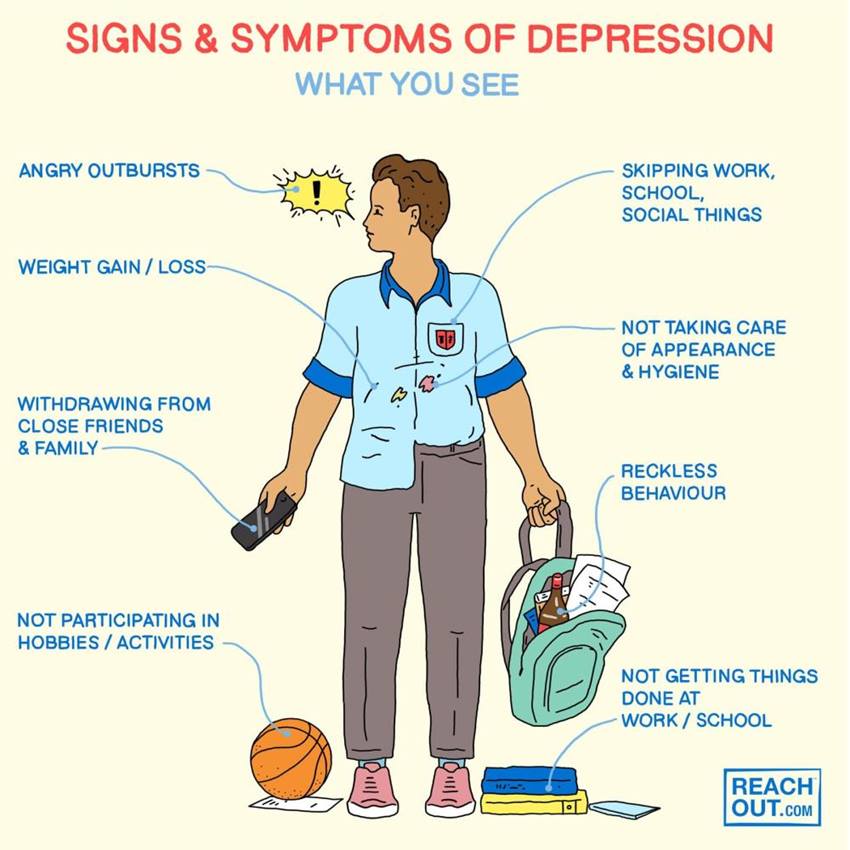Depression Is Not A Trend
While sadness is a symptom of depression, there are more layers to the mental illness, including weight change, lack of interest, anger outbursts, and many others.
November 29, 2021
What does it mean to be depressed? Unfortunately, many people do not know the true answer to this question. Oftentimes, the term depressed gets thrown around with the thought that it means to just be “really sad”. However, depression is a mental illness that’s symptoms and side effects are not so surface level.
According to the American Psychiatric Association (APA), depression is a mental illness that is caused by a chemical imbalance in the brain. Commonly, this disorder is passed down genetically; however, one can still have this disorder based on their living environment or from having a stress induced, pessimistic personality. Symptoms of this illness can vary from severity, but often include overwhelming feelings of sadness, loss of interest in hobbies, changes in appetite and sleeping habits, loss of energy, suicidal thoughts, and a variety of other symptoms.
Though sadness is a symptom of depression, simply being sad is not the same as being depressed. There are many differences between the two, some being that depression involves feeling these negative feelings for up to two weeks, while spikes in sadness usually come in waves and depression involves feelings of worthlessness and self-loathing, whereas self-esteem is usually maintained when sad.
Even with the drastic differences between the two, it is common to see people label their feelings of sadness as depression when that is not the case. For some reason, nowadays, people almost treat their problems as a competition to see who has the hardest and most severe issues. You hear the phrases “I’m so depressed” and “I’m gonna kill myself” being used when there are actually people who are suffering from this illness without wanting it to be put on displayed who could be seriously having these negative thoughts or trying to overcome symptoms that are affecting them.
Brett Barrera (11) comments on the issue at hand saying,
“ I hear people carelessly talking about being depressed over small situations in everyday life and it makes me wonder if they know the severity of depression — Brett Barrera
Of course, being upset or sad over things is completely valid, but it is important not to mix up being sad with being depressed. Normalizing the phrase depression can be very damaging to the credibility of the illness and can take away the severity of the condition from people who actually suffer from it on a daily basis. Most of the time, people with these illnesses suffer silently and hearing people talk casually about the illness can be triggering. It can also be damaging to self diagnose illnesses like these for these same reasons, which is why it is always important to seek medical evaluation if you think you may have a disorder like depression instead of claiming you do without treatment.
No one should want to be depressed as it is something people struggle to manage with. Some think that people want to claim they have depression, or other disorders, to fit themselves into a category where many others are and feel like they are a part of a larger group. However, saying these negative phrases about yourself is not only damaging to what it actually means to have depression, but it can also be harmful to your own mental health. Labeling yourself as depressed can make you feel trapped in a state of sadness and feel like there is no hope for getting better.
Next time you feel yourself slipping into a slump of sadness, it is important to remember that unless you are showing symptoms of depression, you should not label yourself as depressed and try to have a more positive and kind mindset towards yourself while also being mindful of others who are suffering from mental illnesses.






















